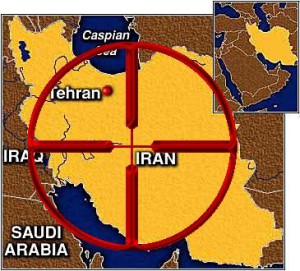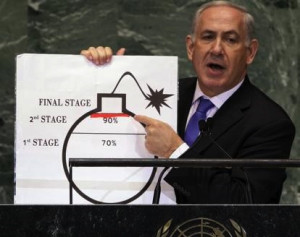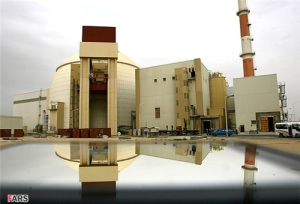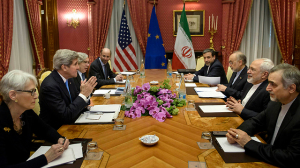Photo: People celebrating agreement in Iran.
Read Part 1 of this important article here. 
What’s behind opposition to the agreement in the U.S.?
In the U.S. political establishment, Congressional opposition to the agreement is strong, mainly among Republicans, who are now the majority in both houses of Congress, but also among some Democrats.
However, the foreign policy hawks do not really have an alternative other than hoping that continued sanctions will cause the downfall of the Islamic Republic. Again, the U.S. lacks the resources to launch a full-scale invasion of Iran.
The arguments presented by the right-wing of the capitalist politicians against the JCPOA are based on myths and lies. They argue that the agreement endangers Israel. The fact is that Israel has an arsenal of nuclear weapons and Iran does not. It is Israel that is a threat to Iran, not vice versa.
They argue that Obama is funding Iran’s government. The funds that the agreement will release to Iran are not U.S. money. They are Iranian assets that have been frozen in foreign banks.
They argue that Iran will now more easily develop nuclear weapons. After years of inspections, there is not a shred of evidence that Iran even has a nuclear weapons program. How is Iran now going to produce nuclear weapons when all of its nuclear facilities are being constantly monitored by IAEA cameras and inspectors?
They argue that Iran is a military threat. But Iran’s annual military budget is under $10 billion, less than 2 percent of its GDP. This is only 1.5 percent of the U.S. military budget of nearly $700 billion. Why would Iran pick a fight with a country that has a military 70 times its own?
But lies and myths notwithstanding, there is a real reason behind the opposition to the agreement and it is more than just partisan politics. Historically, imperialist powers rarely accept anything less than a complete capitulation from oppressed countries, which they consider to be their subjects. So it is understandable why a significant part of the U.S. ruling class is repulsed by the idea of the U.S. reaching any agreement with Iran. The opposition is not about sympathy for Israel. Signing on to the agreement is a recognition of Iran as a regional power and a recognition that the U.S. has to put its regime change policy on hold for now. Many U.S. politicians are not ready to do that.
What’s behind Israel’s opposition?

Prime Minister Netanyahu has called the agreement a “historic mistake” and stated that Israel will not abide by it. In the final months of the negotiations, Netanyahu stopped at nothing to sabotage the agreement. He even formed an alliance with Congressional Republicans and addressed the U.S. Congress in a direct confrontation with the Obama administration, hoping that Congress could stop the agreement from being signed.
Since the U.S. invasion of Iraq, Israel has strongly advocated for a U.S. military attack on Iran. Netanyahu has campaigned for the destruction of Iran, a country he claims presents an “existential threat” to Israel. Israel has repeatedly threatened to take the initiative to bomb Iran itself.
From the perspective of Israel’s ruling class, bombing Iran would be a low-risk proposition. Once military action in any shape or form is launched, it will be the U.S., not Israel, that will bear the risks and the costs. Israel does not have the capability to invade Iran or launch an extended air campaign. But any reaction from Iran would force the U.S. to get involved.
For years, there has existed this false notion that Israel controls U.S. foreign policy in the Middle East. This notion is based on a failure to recognize that the foreign and domestic policies of any country is based on the interests of that country’s ruling class. The U.S. economy is approximately 60 times the size of Israel’s. Why would the U.S. capitalist class subjugate its own interests to that of Israel’s? AIPAC, the rest of the pro-Zionist lobby, indeed any lobbying campaign, can only be successful to the extent that they can convince capitalist politicians that their agenda serves the interests of the U.S. ruling class.
Iran provides a crystal clear example of the falsity of the “Israel controls the U.S.” assumption. Even the staunchly pro-Israel Bush administration did not follow Israel’s advice to bomb Iran. Instead, it explicitly warned Israel against taking any action on its own. The Obama administration, as well as the leadership of other imperialist states, have not bought into Netanyahu’s hyperbole.
Israel’s position on the Iran nuclear agreement is no surprise. Israel’s rise as a powerful, highly militarized state has only been possible thanks to decades of U.S. financial aid, as well as military and diplomatic support. Israel earns this support by providing services to U.S. imperialism, by attacking and weakening independent states and national liberation movements in the region. It is in an atmosphere of war and instability, not one of agreements and understandings, that Israel can maximize its worth to its U.S. sponsors. The U.S. is more than willing to engage in criminal wars and occupations, but it does not have an intrinsic interest in maintaining a war-like relationship with its adversaries at all times.
Prospects for the final approval of the deal
It appears that the U.S. Congress will likely vote down the agreement. It seems clear that a near-unanimous majority of the Republicans in both houses of Congress, probably joined by a few Democrats, will vote against the JCPOA. But Obama has said that he will veto that vote. To override Obama’s veto, Congress would need a 2/3 vote, and it seems unlikely that the opposition will have that many votes. The most probable outcome is that the agreement will eventually hold.
It must also be said that even if Obama’s veto is overridden, the sanctions will have no chance of being implemented as before. The other four permanent UN Security Council members, China, Russia, Britain, France, along with Germany, have already approved the deal. A Congressional vote against the bill will not automatically reset the international sanctions regime. Regardless of how Congress votes, the sanctions as we know them are effectively over.
Regardless of how Congress votes, the sanctions as we know them are effectively over.
Iran’s parliament has given itself a two month time period for deliberating and deciding on the agreement, giving them time until after the matter is settled in the U.S. Congress. Barring unforeseen developments, the JCPOA will likely pass Iran’s parliament. Ayatollah Khamenei, the supreme leader, has repeatedly expressed support for President Rouhani and Foreign Minister Zarif. He has even characterized their efforts as “heroic flexibility.” Of course, at other times, Khamenei has lacked the decisiveness to make an unambiguous stand, making fiery speeches that seem to suggest his opposition to the deal. But when push comes to shove, the weight of the sanctions on Iran is too much for the state to vote down the agreement.

How the agreement could be used as a trap
Following the 1991 Gulf War, the UN formed the United Nations Special Commission (UNSCOM), charged with finding and eliminating Iraq’s alleged weapons of mass destruction. In effect, UNSCOM turned into another imperialist tool for regime change. All the way up to the 2003 invasion of Iraq, UNSCOM had an inexhaustible list of sites it demanded to inspect. Some members of UNSCOM provided a steady flow of intelligence data to the U.S. government using information gathered during the inspections. Often times, inspection sites would become targets for U.S./British aerial bombings shortly after the inspections.
Several times during those years, Iraq refused to cooperate with UNSCOM, citing the fact that the inspections were never going to end and that the intelligence gathered were used for targets of the relentless aerial bombardments. But ongoing U.S./U.K. air bombing campaigns, which continued during the 12 years of the genocidal sanctions on Iraq, each time forced Iraq to continue providing access to the sites UNSCOM demanded.
In the end, after 12 years of inspections, UNSCOM’s work remained “incomplete,” allowing the United States and its allies to invade Iraq on the pretense of the existence of WMD. Obviously, following the invasion of Iraq, no WMD were discovered other than those used by the U.S.
The agreement with Iran runs the risk of being manipulated the same way. The U.S. and its imperialist allies would like nothing more than to use the agreement to discover and document all kinds of military secrets about Iran. And every time there is an IAEA report of lack of compliance, Iran can be subjected to another crisis. At the same time, while the imperialists will likely push Iran as far as they can, they will have a vested interest in not letting the whole agreement fall apart. So Iran will have some leverage too. Negotiations over the last two years have shown that Iran’s representatives do not negotiate from a position of weakness.
Negotiations and power relations

Negotiations between adversaries are always a reflection of power relations. The agreement resulting from any negotiations is what both sides can live with under the current balance of power. Negotiations are not a mechanism to produce an outcome of equity or fairness, particularly when they are between imperialist powers and oppressed nations. We should always keep the power relations in mind, whether we are evaluating a labor contract, a peace treaty or any other agreement.
In reality, there is nothing fair about the JCPOA. Israel will get to keep its nuclear bombs, not even sign the NPT and be subjected to no restrictions. The U.S., UK, France and others will get to keep their terrifying stockpile of nuclear weapons and not even pretend to be dismantling them, as the NPT requires. In fact the U.S. is funding the expansion of its nuclear weapons, a direct violation of the NPT, to which the U.S. is a signatory. And Iran is forced to observe significant restrictions on the suspicion that it may one day want to develop nuclear weapons. The enforcers of the deal are all nuclear weapon states, the U.S. being the only state that has actually used them.
But the agreement should be analyzed in the context of power relations. We are living in a world where the imperialists currently dominate the world militarily, economically and politically. Iran can do little to the powers that have sanctioned its economy. The imperialists can not only continue and expand the sanctions, but they can potentially attack Iran militarily.
Using contract negotiations and standoffs between labor and the bosses as an example, one can hope that the contract can improve the wages and work conditions of the workers. It would be foolish to expect a labor contract to end the exploitation of the workers. Even the most militant leadership and the best organized rank and file cannot hope to accomplish such an outcome.
Similarly, we could not have hoped for negotiations between Iran and the imperialist powers to produce an equitable outcome. It would be foolish to expect the imperialists to come out of the negotiations acknowledging Iran’s right to independent development, removing the sanctions and offering Iran the support to which it is entitled under the NPT.
Under the current balance of forces, it is unrealistic to argue Iran could have gotten a better deal. In fact, it is uncertain that even this deal will get final approval from the U.S. Strong Congressional opposition, the likely upcoming vote against the JCPOA, and the possibility of a veto override, are testament to the fact that, for Iran, this deal pushes the outer limits of what could have been accomplished through negotiations.
The JCPOA is not a capitulation by Iran, a compromise of its territorial integrity or a giving away of its sovereignty. If it were a capitulation, there would be no opposition to it in the U.S. If Iran had agreed to the imperialist demands of shutting down its nuclear reactor, stopping uranium enrichment altogether, halting all of its nuclear research, and promising not to continue any nuclear work, that would have been a capitulation.
Even if an oppressed country were to capitulate to imperialist-imposed sanctions and economic strangulation, it is the imposers of the sanctions, not the victims of the sanctions, who should be condemned. To overly emphasize the concessions Iran had to make and to ignore or minimize the concessions that the imperialists had to make, does not strengthen the hands of radical forces. It strengthens the hands of the imperialists.

Historic achievement
The agreement is a historic achievement for Iran, not because it is fair but because it has forced imperialists to back down. We have to remember that for over a decade, a U.S. invasion and occupation of Iran has been a real possibility. When President Bush listed Iran, along with Iraq and North Korea, as part of an “axis of evil,” the whole world knew that Iran could be next in line after Iraq.
Many times during that period there were specific predictions and dates on when the U.S. would invade Iran. The U.S. has had sanctions on Iran since shortly after the 1979 revolution. Since 2011, the sanctions were extended significantly to the point that Iran was essentially locked out of the world economy.
For all these years, U.S. presidents, both Bush II and Obama, have stated openly that a U.S. military action against Iran was “an option on the table.” On the nuclear issue, the U.S. line had been that Iran must halt its nuclear program entirely and indefinitely. Washington’s line effectively was: “You shut down your nuclear work and then we’ll negotiate.”
The JCPOA may not be all that Iran would have wanted, but it has forced the imperialists to back down
The JCPOA may not be all that Iran would have wanted, but it has forced the imperialists to back down. Iran will continue doing nuclear work. The Bushehr nuclear power plant will continue operating. The Fordow facility, which is practically impenetrable to aerial bombings, will remain operational, although limited to doing research. Iranian nuclear scientists over the years have made tremendous progress in understanding the technology. To have the most militaristic state in the world, the U.S., back down from regime change, end the sanctions and give concessions is a historic achievement. This is why celebrations have taken place in the streets around Iran.
The fact that the U.S. and its imperialist partners have been willing to reach any agreement at all with Iran is a recognition of the limits of imperialist power and the power of independent development. Not all factions of the imperialist ruling establishment are willing to accept this reality. But the fact is that the world does not run in accordance to imperialist designs. It is not just imperialism, but also resistance to imperialism, that is shaping developments in the world today.






